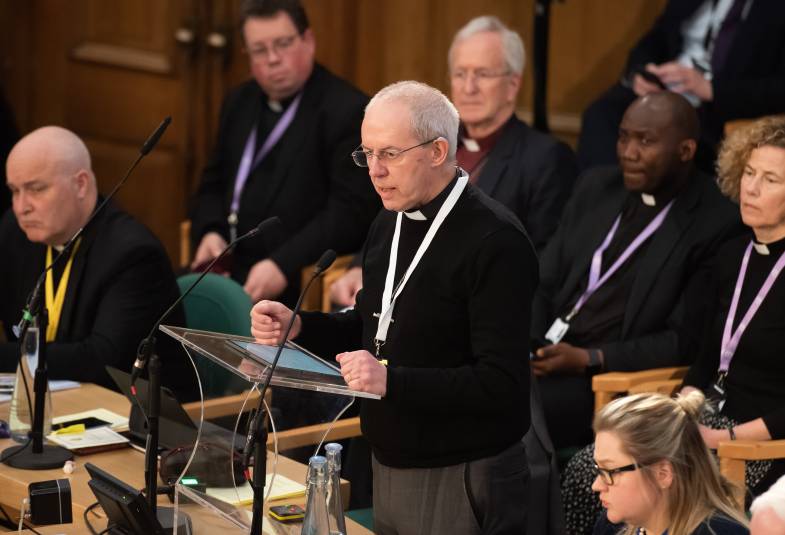
The Archbishop of Canterbury’s speech in Living in Love and Faith debate at General Synod on Wednesday 8th February 2023 in full:
We are not divided but we disagree, and that is very painful. And I will use again the words close to those I used to the Bishops gathered at the Lambeth Conference on a very similar debate.
For some, to question the inherited teaching damages witness and is sinful: you point out that in many provinces across the Anglican Communion any change might make the church a victim of derision, contempt and even attack for being part of what is called the ‘gay church’. For we are often seen as the Mother Church.
For others, you have not arrived easily at the conclusion that we need to change. You are not careless about scripture. You do not reject Christ and His authority. But to question this change makes the church here and abroad a victim of derision, contempt, and even attack for being part of the perceived ‘homophobic church’.
Listening and loving is about what has been brought forward by the House of Bishops. It has been consulted extensively with the primates and many others in the Anglican Communion. What we are seeking is what we understand from the Spirit is right, not what is convenient or easy. There are no convenient or easy ways forward.
What we have in this conversation and the decision we make today, is at its heart the chance publicly to witness to Christ in the most difficult, distinctive and radical way – to disagree passionately and yet to be clear that we uphold our need for one another, and for the world, to come to the knowledge of being loved by God in Christ.
Let me be clear on this point, we do that by saying to the world: unity in Jesus Christ is our common identity, and difference must be worked out within that identity. And we are told by Christ himself that such unity reveals Christ in the world; we heard that in the New Testament Lectionary reading for Morning Prayer today.
Even things that are so important and so painful for us, are not as important as the essential-ness of others. That is our witness to a world that throws others away, excludes them, divides in the face of disagreement, that sides with its own echo chamber. This is the counter-cultural decision.
In 1 Corinthians 12, we read about the need we have for other people. The eye cannot say to the hand ‘I have no need of you’. We need everyone in the body of Christ, if we are to be genuine ambassadors of reconciliation. We need the Communion, we need all Christians, for we are a Church catholic.
I know there is fear of a slippery slope, of what may or may not happen at some point in the future, but let us not give in to the fear of a future which we can neither predict nor control. Fear leads us to do the wrong things - trying to secure the future for God tomorrow, rather than trusting the Holy Spirit today.
I have just been in Westminster Hall hearing President Zelensky, who knows well what it means for the world to change overnight. And who knows here what will come to us over the next few years, not least from there.
Each of us will answer to God at the judgement for our decisions on this matter. We are personally responsible. I am supporting these resources, not I think because I am controlled by culture but because of scripture, tradition and reason evidenced in the vast work done over the last six years so ably by so many.
I may be wrong, of course I may, but I cannot duck the issue any more than anyone else here. I ask each member of Synod to vote with their Spirit-inspired consciences, scripturally and spiritually guided, and not because groups or lobbies or outsiders have told you to. I have heard them over the last two weeks in Parliament, and been told exactly what to do. I am not doing any of it.
Pope Francis - sorry to drop the name, I am terribly conscious of it - Pope Francis talked about LGBTQI+ people in his press conference on the plane coming back from South Sudan on Sunday. I quote him exactly: “I am not talking about groups, but about people.”
So let us decide as we each conclude the Lord desires. Above all, let us debate remembering that all Christians are indispensable members of God’s church, all Christians, and whatever our views or theirs will remain so. And let us show that in how we speak, and let us show that in how we decide, and that we are above all the church that demonstrates the call of God to people whom he desires to know and love.